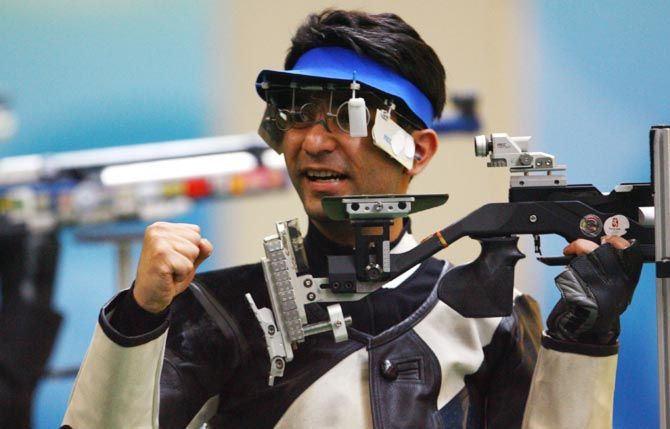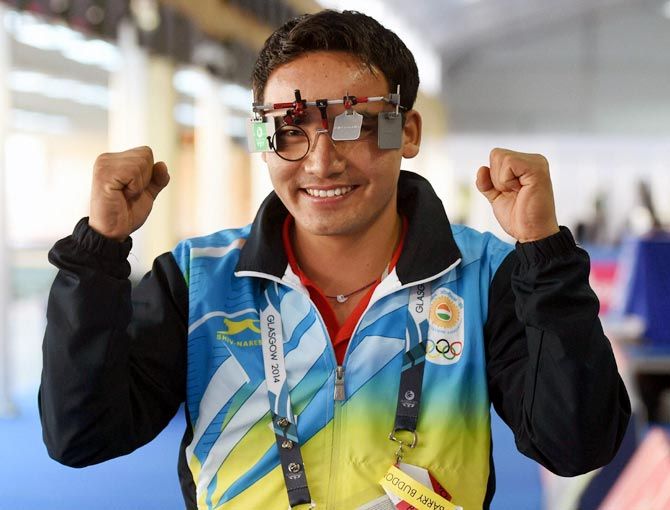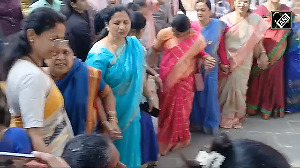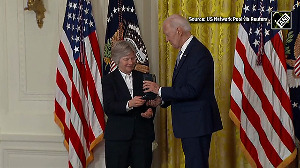
Bolstered by a better-than-expected performance in the Commonwealth Games, India’s athletes are looking to assert themselves against the sporting might of continental powerhouses like China and Japan in the 17th Asian Games, commencing in Incheon on Friday.
The haul of 64 medals at the Commonwealth Games, in July-August, which included 15 gold, should act as the ideal springboard for the Indian contingent to better its medal tally at Guangzhou, China, four years ago.
However, reality is that the Asian Games is far tougher to excel in than the Commonwealth Games. Barring a few disciplines, the Chinese juggernaut, followed by the might of South Korea, Japan and a few countries, including those belonging to the erstwhile Soviet Bloc, is set to roll again.
In 2010, the total medals scooped by the Indian contingent at the Asiad was 65 - 14 gold, 17 silver and 34 bronze - a month after a record haul of 101, including 38 gold, in the Commonwealth Games in New Delhi.
The sizeable heist in Guangzhou piloted the country to a highly creditable sixth spot on the table, which was topped by hosts China, with a staggering haul of 199 gold medals.

The sixth place finish in Guangzhou was India's best in Asian Games history after the fifth placing it grabbed when hosting the pan-Asian sports spectacle in 1982 at New Delhi.
India ended up eighth in 2002 when South Korea previously hosted the Games and retained the position four years later in Doha, Qatar, before improving it by two rungs in Guangzhou, leading to the current optimism that the country has the capability to finish even in the top five.
This time the government, on September 9, pruned the size of the contingent, from what was sent to it by the Indian Olympic Association. The contingent is now 679-strong -– including 516 athletes -- from the initial 942 comprising 662 athletes and the rest officials.
The size of the contingent is still quite big and would be seen in action in aquatics, archery, athletics, badminton, basketball, boxing, canoeing and kayaking, cycling, equestrian, football, golf, gymnastics, handball, hockey, judo, kabaddi, rowing, sepaktakraw, shooting, squash, taekwondo, table tennis, tennis, volleyball, wrestling, wushu, weightlifting, and yachting.
The Sports Authority of India is confident that India will better the 2010 tally.
"We got 64 medals at the recent Commonwealth Games and I must say it was a satisfying performance. For Asian Games, we are confident of touching the 70-medal mark which would be better than last time," SAI Director General Jiji Thomson has predicted. However, that view was aired before the depletion of the tennis team, in particular.
The Sports Authority of India is expecting the bulk of the medals from shooting (10-14 medals) and athletics (12-16).
The country is also be expecting medals from the badminton and squash teams, the boxing ring, wrestling and kabaddi, where the men are gunning for their seventh straight gold and women their second on the trot.
The country's medal hopes in tennis, in which it has scooped up 23 medals in previous editions, have been dented severely by the pull-out of top players Somdev Devvarman, the men's singles winner in 2010, and doubles specialists Leander Paes and Rohan Bopanna.

Thankfully for the contingent, Sania Mirza, the leading women’s player, who had decided to skip the multi-discipline event to garner valuable ranking points on the professional circuit, had a change of heart and will be seen in action at Incheon.
But the second-string men's squad will be severely tested and the medal haul is expected to be meagre after the excellent haul of 2-1-2 in 2010.
The hockey competition is also very important for India, with the Asian Games winners gaining a direct entry to the Rio Olympics two years later.
The Sardar Singh-led men's squad -- currently looking strong in the continent – will be looking to end the gold medal drought extending from 1998 in Bangkok.
In the last edition, a shock semi-final loss to Malaysia ended their title hopes but, since then, the performance has improved, albeit only marginally, and fans are expecting a golden touch this time around in a new format, which will see the game being played in four quarters of 15 minutes each for the first time ever.
Expectedly, the onus of providing the country a bagful of medals lies mainly on the track and field athletes, the star-studded shooting squad, as well as the boxing and wrestling teams who will, however, be without injured Olympic medallists Vijender Singh and Sushil Kumar respectively.
The athletics squad has men's hopeful Vikas Gowda, who is entering the fray as the Commonwealth Games men's discus throw champion but without an Asian Games gold in his kitty, and seasoned women's discus specialists Krishna Poonia and Glasgow CWG silver-medallist Seema Punia.
There are also talented track athletes, like Tintu Luka, a protege of former Asian Games star P T Usha, and national men's triple jump record holder Arpinder Singh, a bronze-medallist in the Glasgow CWG.
Another hopeful is men's high hurdler Siddhanth Thingalaya, who won the 110m hurdles race in the Federation Cup meet last month.
Athletics, which has accounted for over 200 medals won by the country in the quadrennial sports extravaganza, had lived up to its billing in Guangzhou four years ago with a total contribution of 12 medals that included five gold.
Shooting, which provided eight medals, with a lone gold won by trap shooter Ronjan Sodhi who is out of the squad now, will see the likes of 2008 Beijing Olympic Games gold-medallist Abhinav Bindra and another top rifle shooter Gagan Narang striving for the gold which eluded them four years ago.
Ironically, Bindra, who has won Olympic, World and Commonwealth Games titles, has not won a single individual medal of any hue in the Asian Games and this could be his last chance to set that record straight. He won a team silver in Guangzhou but his poor form at the recent World Championships in Spain is cause for worry.
Bindra got a silver in the 10m air rifle four years ago and this could be his last chance too to add the Asian Games gold to his bulky kitty of shooting titles.
Hopes are also pinned on new shooting stars, like freshly-crowned men's Commonwealth Games champions Jitu Rai (men's 50m pistol), whose confidence has been boosted by having already won a berth in the 2016 Olympic Games with a silver medal in the 50m air pistol event at the recent World Championship and Apurvi Chandela (women's 10m air rifle), apart from teenagers Malaika Goel and Ayonika Paul, who won silver medals at Glasgow.
The Indian shooters, though, can expect intense competition, especially from the Chinese and South Korean shooters apart from the marksmen and women from the former Soviet-bloc countries and some Arabian Gulf nations like Kuwait.
In the absence of back-to-back Olympic-medallist Sushil, the wrestling squad would be looking towards London Olympics bronze-winner and two-time CWG champion Yogeshwar Dutt to end a 28-year wait for gold in grappling.

The wrestling mat provided just three bronze medals four years ago and the grapplers would be eager to improve vastly on that as they have preserved themselves for this mega-event by skipping the World Championships at Tashkent earlier this month.
Now that the Boxing India elections are over and provisional recognition provided for the new body, the boxing squad can look forward to fighting for laurels under the Indian flag.
Without its poster boy Vijender to give the push, like he did four years ago, the squad will now be looking up to its 33-year-old comeback man Akhil Kumar, the 2006 Commonwealth Games champion, to provide the inspiration to better its superb haul of nine medals (two gold, three silver and four bronze), which was second only to athletics in Guangzhou.
Among women is M C Mary Kom, the former World champion, who is eager to make it a gold this time around after the bronze in the 51kg category in the last Games.
There is also the racquet discipline of badminton, spearheaded by the women's duo of Olympic bronze winner Saina Nehwal and two-time medallist in World Championships, P V Sindhu.
After a disappointing run at the preceding World Championships in Denmark, when she exited in the quarterfinals, Saina moved away from her home base of Hyderabad and national coach Pullela Gopichand to train under Vimal Kumar in Bangalore ahead of these Games.
The competition for Saina, Sindhu as well as the men shuttlers, like London Olympics quarter-finalist P Kashyap, will be extremely stiff from China, Indonesia, Malaysia, hosts Korea and Japan to name a few.
Women's doubles specialists Jwala Gutta has pulled out due to a knee injury and her long-time partner Ashwini Ponnappa will have to hunt for the medal with a new partner, a none-too-easy task within such a short period of time.

Saurav Ghosal and Deepika Pallikal, who bagged the women's doubles gold with Joshna Chinappa in the Glasgow CWG, would be spearheading the campaign in squash in which the country is expected to win medals in all four categories.
Ghosal is the top seed in men's singles and the team has been seeded third in both men and women's groups.
India will also look forward to some success from their weightlifters, who drew a blank in Guangzhou, and archers, who too performed dismally four years ago.
The water disciplines of rowing and yachting – generally held far away from the main centre of action - have been happy medal hunting arenas, especially over the last two editions for the former and the last three for the latter.
The rowers had won five silver and two bronze combined at Doha, Qatar, and Guangzhou, China. Bajrang Lal Takhar had scripted history in 2010 by winning the gold in men's single sculls four years after winning the first-ever individual silver in Doha.
In Guangzhou, India secured eight medals in chess, cue sports and roller sports but these disciplines have been axed in the Incheon Games which has dealt a big blow to the country's medal aspirations.
India will also be competing in other disciplines like men's and women's football, men's and women's volleyball men's basketball, table tennis, golf, equestrian, judo, taekwondo, gymnastics, handball wushu and sepak takraw, but medal hopes from these arenas are slim, if not non-existent.











 © 2025 Rediff.com -
© 2025 Rediff.com -